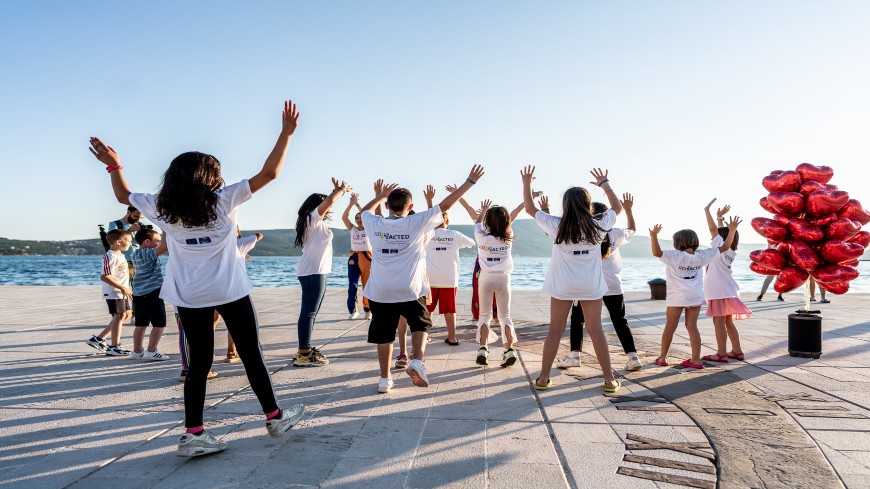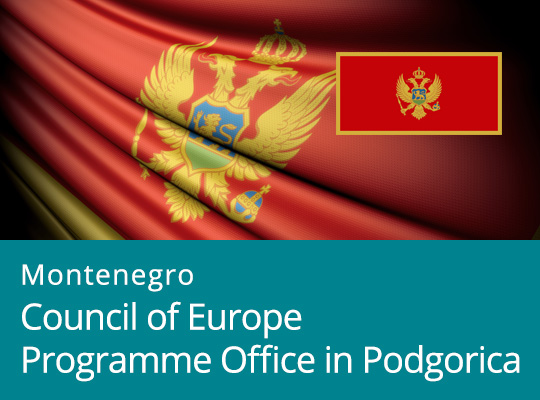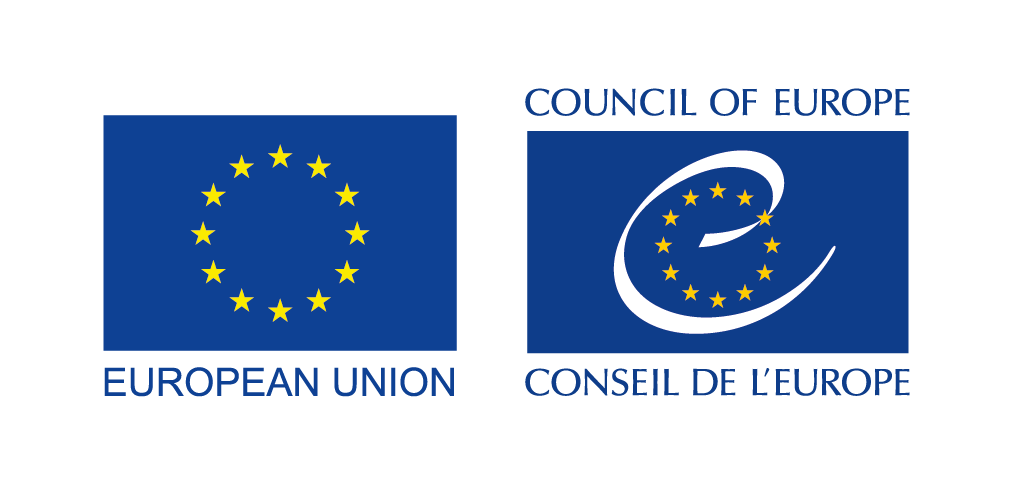It is important for local institutions and education establishments to reduce social distance and promote respect between all community members in local societies, notwithstanding their ethnic origins, and to advance the values of diversity and inclusion from the early stage of education, in creative ways, to ensure all children feel equal.
This was the key message of workshops with pupils from the primary school of Tivat ‘Drago Milovic’ that took place on 14 and 15 June. They are part of the initiative of the European Union and the Council of Europe, “Block the Hatred. Share the Love!”, in partnership with the joint EU and Council of Europe programme “Promoting good governance and Roma empowerment at local level (ROMACTED II)” and were organised in co-operation with the Municipality of Tivat and local NGOs partners active in the local community.
Dubravka Drakic, well known actor and university professor, as well as Tamara Radjenovic, internationally renowned opera singer and other campaign ambassadors have joined the activity.
Dubravka Drakic’s message was that art does not have colour, race, belonging: “Art is universal, and with drama we wish to have every individual expressing its own sense of feeling part of the community. Theatre is an additional tool to communicate about and present the beauty of diversity. These are values that this campaign is promoting, and this is why I joined our partners in this effort”, she said.
Opera singer Tamara Radjenovic stated: “Opera allows us to be free. Freedom means that we can be ourselves, regardless the language we speak; our nationality, our religious or ethnic belonging. Each and every of my international performances taught me a lot about diversity, about respecting others, about being tolerant. Cultures influence me as a singer. Let’s influence each other: singing, performing, talking… Let’s block the hatred and share the love with people around us today!”
On this occasion, Evgenia Giakoumopoulou, Head of Operations of the Council of Europe Programme Office in Podgorica, recalled the importance of the joint EU and Council of Europe initiatives on promoting diversity and equality, as well as on promoting good governance and Roma empowerment at local level, for building an inclusive and diverse society where institutions and non-state actors join forces in ensuring that every member of the society feels welcome and respected.
“Hate speech is dangerous as it not only pits individuals against the others, but risks antagonising whole groups and communities. It stigmatises already vulnerable or marginalised individuals, damaging the social fabric and social cohesion. It therefore also affects the Roma and Egyptian community members in our society. The in Tivat are using theatre, an engaging art form to convey the messages of inclusion and respect among children, with the hope that they carry those further”, said Giakoumopoulou.
Sinisa Bjekovic, Protector of Human Rights and Freedoms of Montenegro, recalled that a bit more than 20 years ago, exactly in Tivat, there was the beginning of the initiative, so called the network Center for human rights of Southeast Europe. As he added, the task of the of the institution he comes from is to try to use also this type of gatherings to convey a message on what that institution should be. "I reckon that we used today's meeting to convey a message to the new generation, a message to children who are not burdened by all our past and future problems, and sometimes misconceptions. I would like to tell them to think for themselves, because what I was able to hear as a representative of the institution of the Protector is that children's voices often held much more reason than the adults did. Without understanding, tolerance and love, the whole story of our future, economic, political and any other, is in vain. Without understanding among people, there is no progress."
Vladimir Arsić, Deputy Mayor of Tivat Municipality, explained the proactive approach of the Municipality of Tivat in implementing the policy of sustainable integration of Roma and Egyptians in public life and development of the municipality, and said that the municipality would be ready to share these good practices with other local entities in similar situation.
Mirjana Vlahovic-Andrijasevic, Director General at the Ministry of Human and Minority Rights, stressed the multiethnic and multicultural diversity of Montenegro which has been putting a lot of effort into becoming part of a European family based on shared values. The Ministry of Human and Minority Rights notably has done much to channel the problem of hate speech through legal solutions and strategic documents, she noted. “The "Block the hatred, share the love" campaign is designed and implemented by the Council of Europe in a completely new, fresh way, demonstrating creative approaches to handling the problem”, she said. “Engaging these wonderful young students, together with successful and inspirational figures from Montenegro sends a loud and clear message that there are ways to block hatred and turn a negative narrative into a positive one”, concluded Vlahovic-Andrijasevic.
Mladena Soldat – Ivović, Director of the Elementary School “Drago Milović“, underlined that children must be educated about non-discrimination, coexistence, and acceptance of diversity through both formal and non-formal ways. "That is why I am glad that the pupils of our school, including those coming from the Roma/Egyptian community, had the opportunity to learn valuable life lessons in a very creative way, which we hope will make them better people and will render our society more tolerant and inclusive", she emphasised.
The “Block the hatred. Share the love!” initiative aims to combat various forms of hate speech targeting specific communities and individuals in Montenegrin society. The campaign is supported by prominent public figures, institutions and activists, who will promote diversity and equality in Montenegro and in the region, through personal storytelling, testimonies and exchange of good practices. The campaign is part of the joint European Union and Council of Europe programme "Horizontal Facility for the Western Balkans and Turkey 2019-2022". This activity is implemented in co-operation with the EU-COE Joint Programme “Promoting good governance and Roma empowerment at local level (ROMACTED II)”
More information:
Webpage of the campaign and its activities
Follow the campaign Facebook; Instagram; Twitter
For more information contact:
Marija Simić, Communication Officer, Council of Europe [email protected]
+381 63 60 13 37
Marija Drašković, Amplitudo [email protected]
+382 20 223 244 or +382 67 053 540





